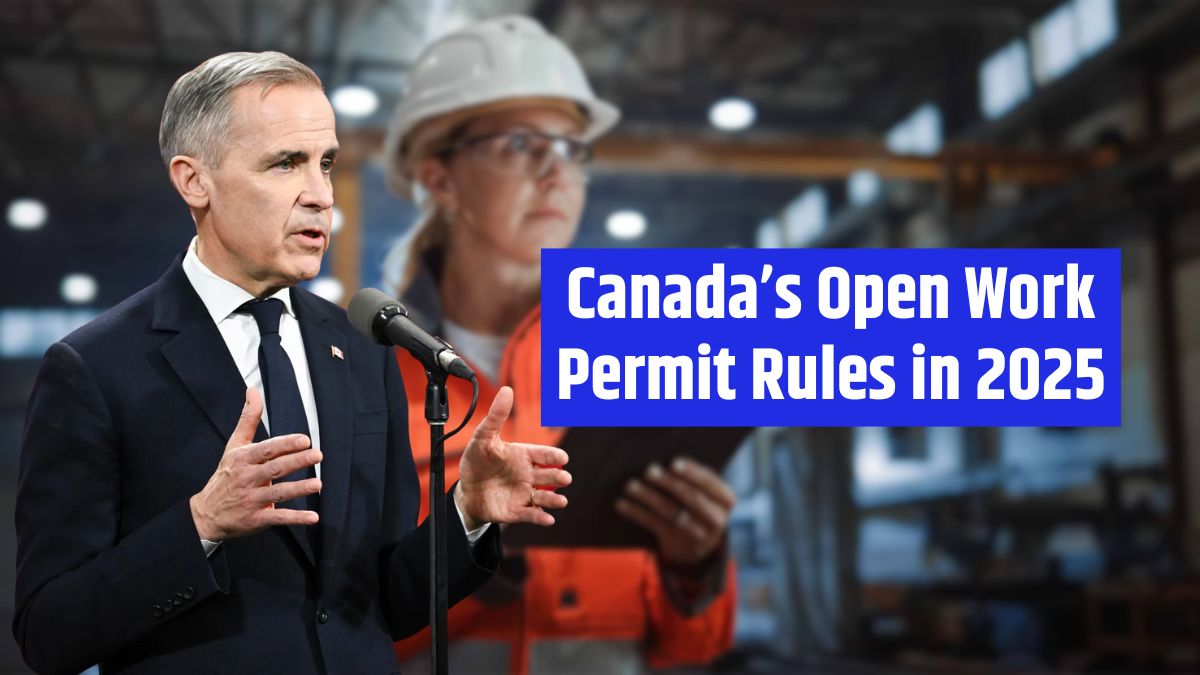Canada has updated the rules for its Open Work Permit (OWP) effective January 2025, reshaping how foreign workers, international students, and their families can access work opportunities. The new policy narrows eligibility, particularly for spouses and dependent children, while continuing to provide pathways for international graduates and permanent residence applicants.
The Open Work Permit remains one of the most flexible authorizations under the immigration system, as it allows holders to work for almost any employer in Canada without requiring a job offer. However, the government has refined the framework to align with economic priorities and address labor shortages in specific industries such as healthcare and construction.
With thousands of temporary residents entering Canada every year, these changes reflect Ottawa’s goal of balancing labor demand with controlled immigration growth
Canada Open Work Permit 2025 – An Overview
The Open Work Permit (OWP) continues to be administered by Immigration, Refugees and Citizenship Canada (IRCC). It grants holders the ability to work for almost any employer without binding them to a single job.
Key Features of the 2025 OWP:
- Administered by: Immigration, Refugees and Citizenship Canada (IRCC)
- Application Fee: CAD $255
- Application Method: Online via IRCC portal
- Type of Permit: Open authorization (not tied to one employer)
- Validity: Up to three years, depending on the principal applicant’s permit
- Processing Time: Varies by country and category
Why the OWP Is Considered Valuable
Unlike employer-specific permits, the OWP offers mobility, allowing holders to:
- Change employers freely
- Move between provinces
- Explore multiple industries
For international graduates, the Post-Graduation Work Permit (PGWP) is crucial as it allows them to enter the workforce directly after studies. For spouses, the OWP provides financial independence while accompanying their partner. For permanent residence applicants, the Bridging Open Work Permit (BOWP) keeps them legally employed while awaiting decisions.
Work experience gained under an OWP also strengthens applications for Express Entry and Provincial Nominee Programs (PNPs), where Canadian employment significantly boosts scores.
Who Can Apply Under the 2025 Rules
The government has clarified eligibility groups to better target labor market needs.
- International Graduates – Must complete at least eight months of full-time study at a Designated Learning Institution (DLI). The PGWP length usually matches the study program, capped at three years.
- Spouses of International Students – Only spouses of those studying in Master’s, Doctoral, or professional programs (law, medicine, engineering) qualify.
- Spouses of Skilled Workers – Eligible if the principal applicant is employed in TEER 0 or 1 occupations, or in TEER 2 and 3 shortage industries such as healthcare or construction. The main applicant’s permit must have at least 16 months of validity.
- Permanent Residence Applicants – May apply for a Bridging OWP while awaiting PR results.
- Other Groups – Certain refugees, International Experience Canada (IEC) participants, and hardship applicants remain eligible.
Major Changes for Families
The most striking reforms affect spouses and children.
- Spouses of International Students – Now limited to those studying graduate-level or professional programs. Spouses of undergraduate students no longer qualify.
- Spouses of Skilled Workers – An additional rule requires the main applicant’s work permit to have at least 16 months left.
- Dependent Children – No longer eligible for OWPs. They may still enter Canada with study permits, but cannot automatically work under the new framework.
Impact Summary (2025 Updates):
- Spouses of Students: Only Master’s, Doctoral, and professional program partners qualify.
- Spouses of Workers: Must meet TEER 0/1 or shortage sector rules, plus permit validity of 16 months.
- Dependent Children: Excluded from OWP eligibility.
Application Process for OWP in 2025
Applications must be submitted online through the IRCC portal.
Steps include:
- Complete the OWP application form.
- Upload required documents:
- Valid passport
- Proof of relationship (marriage certificate, common-law declaration)
- Principal applicant’s valid study or work permit
- Enrollment or employment proof of the main applicant
- Pay the CAD $255 fee.
- Submit the application and wait for processing.
Processing times vary depending on country of residence. Biometrics may be required during the process.
Alternatives for Those Who No Longer Qualify
With narrower rules in 2025, some applicants must consider other options:
- Employer-Specific Work Permits – Requires a job offer and often a Labour Market Impact Assessment (LMIA).
- Permanent Residency Streams – Express Entry or PNPs may provide eligibility for a Bridging OWP later.
- Study Permits for Children – While children cannot get OWPs, they may pursue education through a study permit.
These alternatives ensure families still have entry pathways, though with more conditions.
Why Canada Changed the Policy
The reforms are tied to national priorities. Canada faces shortages in healthcare and construction, and the OWP system has been refined to direct talent into these sectors.
At the same time, the rapid growth of temporary residents has placed pressure on housing and public services. Restricting spousal and dependent access aims to reduce strain while keeping pathways open for skilled talent.
The new rules also aim to strengthen program integrity, preventing misuse and ensuring fairness across applicants.
Final Outlook
The Canada Open Work Permit 2025 still offers wide flexibility but now operates under a stricter framework. International graduates, PR applicants, and families in targeted sectors continue to benefit, while spouses of undergraduate students and dependent children face reduced access.
These reforms highlight Canada’s attempt to balance workforce needs with sustainable immigration growth, ensuring that temporary residents contribute meaningfully to the economy
FAQs – Canada Open Work Permit 2025
Q1: Can all spouses of international students still apply for an OWP?
No. Only spouses of Master’s, Doctoral, or professional program students qualify under the 2025 rules.
Q2: Are dependent children eligible for open work permits in 2025?
No. Dependent children are excluded from OWP eligibility but may apply for a study permit.
Q3: How much is the OWP application fee in 2025?
The fee remains CAD $255, payable during online submission.
Q4: Do applicants need a job offer for an OWP?
No. The OWP allows holders to work for almost any employer in Canada without requiring a job offer.
Q5: Why did Canada change the OWP rules?
The changes were introduced to address labor shortages, manage temporary resident growth, and ensure system integrity.









